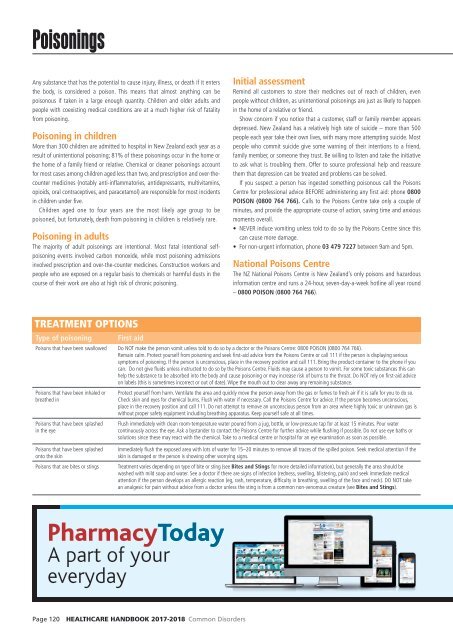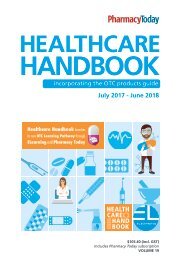2017 HCHB_digital
You also want an ePaper? Increase the reach of your titles
YUMPU automatically turns print PDFs into web optimized ePapers that Google loves.
Poisonings<br />
Any substance that has the potential to cause injury, illness, or death if it enters<br />
the body, is considered a poison. This means that almost anything can be<br />
poisonous if taken in a large enough quantity. Children and older adults and<br />
people with coexisting medical conditions are at a much higher risk of fatality<br />
from poisoning.<br />
Poisoning in children<br />
More than 300 children are admitted to hospital in New Zealand each year as a<br />
result of unintentional poisoning; 81% of these poisonings occur in the home or<br />
the home of a family friend or relative. Chemical or cleaner poisonings account<br />
for most cases among children aged less than two, and prescription and over-thecounter<br />
medicines (notably anti-inflammatories, antidepressants, multivitamins,<br />
opioids, oral contraceptives, and paracetamol) are responsible for most incidents<br />
in children under five.<br />
Children aged one to four years are the most likely age group to be<br />
poisoned, but fortunately, death from poisoning in children is relatively rare.<br />
Poisoning in adults<br />
The majority of adult poisonings are intentional. Most fatal intentional selfpoisoning<br />
events involved carbon monoxide, while most poisoning admissions<br />
involved prescription and over-the-counter medicines. Construction workers and<br />
people who are exposed on a regular basis to chemicals or harmful dusts in the<br />
course of their work are also at high risk of chronic poisoning.<br />
Initial assessment<br />
Remind all customers to store their medicines out of reach of children, even<br />
people without children, as unintentional poisonings are just as likely to happen<br />
in the home of a relative or friend.<br />
Show concern if you notice that a customer, staff or family member appears<br />
depressed. New Zealand has a relatively high rate of suicide – more than 500<br />
people each year take their own lives, with many more attempting suicide. Most<br />
people who commit suicide give some warning of their intentions to a friend,<br />
family member, or someone they trust. Be willing to listen and take the initiative<br />
to ask what is troubling them. Offer to source professional help and reassure<br />
them that depression can be treated and problems can be solved.<br />
If you suspect a person has ingested something poisonous call the Poisons<br />
Centre for professional advice BEFORE administering any first aid: phone 0800<br />
POISON (0800 764 766). Calls to the Poisons Centre take only a couple of<br />
minutes, and provide the appropriate course of action, saving time and anxious<br />
moments overall.<br />
• NEVER induce vomiting unless told to do so by the Poisons Centre since this<br />
can cause more damage.<br />
• For non-urgent information, phone 03 479 7227 between 9am and 5pm.<br />
National Poisons Centre<br />
The NZ National Poisons Centre is New Zealand’s only poisons and hazardous<br />
information centre and runs a 24-hour, seven-day-a-week hotline all year round<br />
– 0800 POISON (0800 764 766).<br />
TREATMENT OPTIONS<br />
Type of poisoning<br />
First aid<br />
Poisons that have been swallowed Do NOT make the person vomit unless told to do so by a doctor or the Poisons Centre: 0800 POISON (0800 764 766).<br />
Remain calm. Protect yourself from poisoning and seek first-aid advice from the Poisons Centre or call 111 if the person is displaying serious<br />
symptoms of poisoning. If the person is unconscious, place in the recovery position and call 111. Bring the product container to the phone if you<br />
can. Do not give fluids unless instructed to do so by the Poisons Centre. Fluids may cause a person to vomit. For some toxic substances this can<br />
help the substance to be absorbed into the body and cause poisoning or may increase risk of burns to the throat. Do NOT rely on first-aid advice<br />
on labels (this is sometimes incorrect or out of date). Wipe the mouth out to clear away any remaining substance.<br />
Poisons that have been inhaled or<br />
breathed in<br />
Poisons that have been splashed<br />
in the eye<br />
Protect yourself from harm. Ventilate the area and quickly move the person away from the gas or fumes to fresh air if it is safe for you to do so.<br />
Check skin and eyes for chemical burns. Flush with water if necessary. Call the Poisons Centre for advice. If the person becomes unconscious,<br />
place in the recovery position and call 111. Do not attempt to remove an unconscious person from an area where highly toxic or unknown gas is<br />
without proper safety equipment including breathing apparatus. Keep yourself safe at all times.<br />
Flush immediately with clean room-temperature water poured from a jug, bottle, or low-pressure tap for at least 15 minutes. Pour water<br />
continuously across the eye. Ask a bystander to contact the Poisons Centre for further advice while flushing if possible. Do not use eye baths or<br />
solutions since these may react with the chemical. Take to a medical centre or hospital for an eye examination as soon as possible.<br />
Poisons that have been splashed<br />
onto the skin<br />
Poisons that are bites or stings<br />
Immediately flush the exposed area with lots of water for 15–20 minutes to remove all traces of the spilled poison. Seek medical attention if the<br />
skin is damaged or the person is showing other worrying signs.<br />
Treatment varies depending on type of bite or sting (see Bites and Stings for more detailed information), but generally the area should be<br />
washed with mild soap and water. See a doctor if there are signs of infection (redness, swelling, blistering, pain) and seek immediate medical<br />
attention if the person develops an allergic reaction (eg, rash, temperature, difficulty in breathing, swelling of the face and neck). DO NOT take<br />
an analgesic for pain without advice from a doctor unless the sting is from a common non-venomous creature (see Bites and Stings).<br />
PharmacyToday<br />
A part of your<br />
everyday<br />
Page 120 HEALTHCARE HANDBOOK <strong>2017</strong>-2018 Common Disorders



